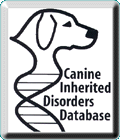
Small intestinal bacterial overgrowth (SIBO)
In this condition, there is a dramatic increase in the number of bacteria in the small intestine, and this interferes with normal absorption of nutrients. The result is chronic intermittent diarrhea, and weight loss or failure to gain weight.
In the German shepherd, this condition is thought to be related to a deficiency of immunoglobulin A (IgA) , the primary immune defense in the small intestine.
Small intestinal bacterial overgrowth (SIBO) may develop in association with exocrine pancreatic insufficiency. It may also be seen with inflammatory bowel disease, although it can't always be determined which came first.
unknown
The condition is usually seen in young dogs, who develop chronic intermittent diarrhea which gradually gets worse, and lose weight or fail to gain weight normally. Some dogs may only show weight loss and in others there may be vomiting.
There is no straightforward test to diagnose SIBO. Because the condition may develop as a complication of many intestinal diseases, it is important to search for any possible underlying cause. Your veterinarian will do tests for parasites, bacterial infections, partial obstruction, and other causes of diarrhea such as exocrine pancreatic insufficiency. Besides these baseline blood and fecal tests, there are several other tests that can be done to support the diagnosis of SIBO.
Antibiotics are used at the same time as any underlying cause is treated. Often, no underlying cause can be found and it becomes a question of long term management. The disorder can usually be controlled with long courses of antibiotics, repeated occasionally if there is a relapse, and dietary management using a therapeutic diet low in carbohydrates and fats.
For the veterinarian: Four weeks of treatment with oxytetracyline is usually successful. Some dogs with SIBO relapse soon after antibiotics are discontinued. This may mean there is an unidentified underlying cause, or there has been permanent functional mucosal damage. Antibiotics, gradually reduced to the lowest dose that will control the diarrhea, may need to be continued for extended periods.
Bacterial overgrowth in the proximal small bowel is increasingly recognized as an important cause of chronic intermittent small bowel diarrhea +/- weight loss in many breeds. There is overgrowth of anaerobic bacteria, which have a greater potential for damaging the intestinal mucosa and causing malabsorption. Anaerobes are also the major cause of bile salt deconjugation, the results of which are fat malabsorption and steatorrhea.
There is no straightforward test to diagnose SIBO. Increased serum folate or reduced cobalamin provide indirect support for the diagnosis, once pancreatic insufficiency has been ruled out. Other helpful tests include absorption and permeability tests and hydrogen breath testing (available in some specialty centres). The diagnosis can be confirmed by microbiologic culture of duodenal juices (obtained endoscopically or by laparotomy) although this is expensive and technically complicated, and may miss some cases of SIBO.
Affected dogs should not be bred, and until more is known about inheritance of this disorder, it is prudent to avoid breeding their parents and siblings as well.
FOR MORE INFORMATION ABOUT THIS DISORDER, PLEASE SEE YOUR VETERINARIAN.
Rutgers, H.C. 1998. Diagnosis and long-term management of bacterial overgrowth in the dog. ACVIM-Proceedings of the 16th Annual Vet. Med. Forum. pp. 482-484.
Burrows, C.F., Batt, R.M., Sherding, R.G. 1995. Diseases of the small intestine. In E.J. Ettinger and E.C. Feldman (eds.) Textbook of Veterinary Internal Medicine, pp. 1169-1232. W.B. Saunders Co., Toronto.
- Disorder Type:

